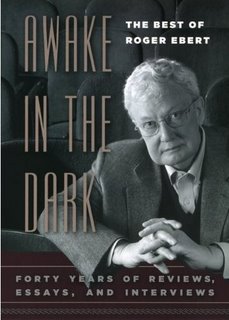 Consider The Best -- a section in the book devoted to that annual moment when his editors insist he name The Best Film Of The Year. Right at the outset Ebert acknowledges that this sort of all-or-nothing deadline has the effect of nudging him to put his critical weight behind a perceived underdog. One such "Year Of The Underdog" was 1980, when Ebert allocated Raging Bull to status of second banana. Ebert's "best" film of that year? The Black Stallion -- and we duly get the full review.
Consider The Best -- a section in the book devoted to that annual moment when his editors insist he name The Best Film Of The Year. Right at the outset Ebert acknowledges that this sort of all-or-nothing deadline has the effect of nudging him to put his critical weight behind a perceived underdog. One such "Year Of The Underdog" was 1980, when Ebert allocated Raging Bull to status of second banana. Ebert's "best" film of that year? The Black Stallion -- and we duly get the full review.So, no, this does not quite qualify as "The Best of Roger Ebert" (it could qualify, though, as Roger Ebert's "best of"). Readers on the hunt of such are better off dipping into The Great Movies and The Great Movies II, and seeking used copies of A Kiss Is Still A Kiss. Or, better yet (because Ebert is an unfailingly generous interlocutor with others in his trade), throw a few bucks down for Roger Ebert's Book of Film -- essentially The Norton Anthology of Film Writing.
Ebert is also, of course, a public personality. We've seen him in tightly formatted exchanges with the late Gene Siskel or the recent Richard Roeper. The formula has been reduced to fast-food basics, so we don't catch too many glimpses behind the curtain anymore. But I do recall the show when Ebert reversed his thumb, admitting his originally dismissive review of Clint Eastwood's Unforgiven was the result of too many extraneous pressures being brought to bear (getting married the day of his viewing and review submission figured prominently as one such pressure).
Now, I happen to think Eastwood's Unforgiven is slightly-better-than-mediocre (as are most of Eastwood's films). But viewing and reviewing a film the day you're getting married?! How charming is that? Any film that gets a thumbs-up on the day of your wedding is going to be one hell of a film -- and let's face facts: this oater simply did not qualify!
I would like to see a lot more of that. I don't want film reviews to turn into, well, blogs exactly. But some injection of the personal -- as opposed to this superior "objective" or "scholarly" tone we're accustomed to -- would, I think, go a long way to reviving film criticism as something the reading public actually cares about.
On that note, my all-time favourite piece by Roger Ebert is noticeably absent from this book. Some years back he attended the Calcutta Film Festival for the first time. He saw, first hand, droves of India's "untouchables". He experienced that continent's frightening and hilarious road etiquette. He commented with conviction on the fragility of human happiness. And he spoke of the ineffable deliciousness of a slice of pizza he'd been given in a Calcutta Dream Palace.
That is the best of Roger Ebert, and I truly hope to someday see it preserved between hardcovers.
3 comments:
I once came across a collection of Roger Ebert's worst movies. I didn't buy it, but I enjoyed flipping through it. There's something enjoyable about seeing a good film critic lay the smack down on a really bad movie. I especially enjoyed his review of "Godzilla"
Thanks for the tip on the Ebert book -- doesn't sound like anything I don't already have or have read.
Too bad about the missing India piece. I'd like to read that myself since I too had noticed that Ebert has been more socially engaged this last decade. I wonder if it's a consequence of spending every day discussing art and culture.
I remember when Frank Rich retired from his role as the NY Times' theatre critic to start writing about politics. He said that the best plays he'd been seeing were politically-themed works that challenged him to think bigger. He wanted to carry that forward.
Given that he's spent the past three years chipping away at Bush and the Republicans, I hope he's taken in some plays once in a while and doesn't regret his choice!
Oh, and ???? -- Ebert's 'bad movie book' was fantastic but still, no one could drop the hammer on a bad movie quite like Gene Siskel. He took apart a Tony Danza movie about 15 years ago and I'm STILL laughing. He is sorely missed!
ジョエル - Ebert's recent takedown of Catwoman is another classic. Very funny.
Scott - odds are you do have most of what's in here, but I should have probably put emphasis on what I appreciated in this book. It collects some of his better essays, including his memoriam of Pauline Kael. And the final section on the future of film criticism, with "guest" editorials by Richard Corliss and Andrew Sarris, is probably the best example in print of the sort of round-table discussions Ebert does so well
Post a Comment